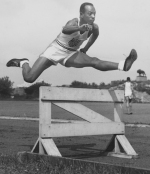
One of my favourite little aphorisms is that a good team learns from its failures, but a great team learns from its successes as well.
Ironically, it’s something I’m far better at helping others with than I am at doing it for myself. Cobbler’s shoes and all that.
That said, for the last couple of years I’ve been part of a learning group with a bunch of non-profit consultants dotted around the world, and one of the most useful exercises we’ve done is exactly that – dissecting success.
It’s useful, because what we learn invariably has wider relevance than we expect. In one session I learned about techniques for hurdling, which I had really no idea could be so relevant.
The case study I’d shared was one where, rather than leading an exec team through a strategy process as I’d normally do, I mentored and coached their own strategy director to lead it.
Perhaps that scenario sounds strange: having a strategy director whose job it is to do this stuff, then getting a strategy expert in as well. But think about it: in sports, you wouldn’t bring athletes, even the best ones in the world, into your squad without having people to coach them, and the more specialist the discipline, the more you need the right coach.
In this case, once the main strategy themes had begun to crystallise and the momentum and pace had built and bedded in, I was able to step back, and the director flew the rest of the way solo.
And fly she did. I didn’t see the final strategy until just before it went public, and hand-on-heart, it’s an outstanding piece of work. I’ll admit I felt a flush of vicarious pride.
When I described the experience to my colleagues, I said my only real contributions had been to help her think more clearly through the vast amount of information coming in; and to feel less stressed about the big set-piece sessions and events that invariably stud any strategy process.
The key, I explained, is to avoid the temptation of seeing them as “the next scary thing”, some kind of culmination that all the work is geared towards, but merely as springboards to kick-start the next phase with better understanding, building engagement, and building momentum.
It sounds trivial, but just shifting your aim for a discussion from, say, getting alignment to getting mobilisation, makes a huge difference.
This is what triggered the hurdles simile from a transatlantic colleague.
Apparently, to be a really good hurdler, as you’re running toward each hurdle you need to deliberately lean much further forward than feels natural, to get your centre of gravity well ahead of your feet.
Jumping off-balance is much harder, and to begin with it feels like you’re going to fall face-first into the hurdle. But once you can do it, with every landing stride you’re building momentum. If you don’t, every time you land it’s like dabbing on the brakes.
Part of the athletics coach’s job is to help hurdlers look beyond simply preparing for the next jump, and instead, preparing for the landing beyond it so they accelerate towards the next one.
It’s a useful metaphor because even now, for my client, getting that strategy launched is just another hurdle – one of many to come. It’s not nearly the end of the race. In fact, the real work has barely begun.
Sure, the launch is a momentous event, but it’s also the moment when the spiked shoe comes back down and grabs the track.
Now is when we find out whether things will pause as we collectively catch our breath, or whether more pace kicks in, the engagement translates into rapid change, and all the great ideas start accelerating along their journey towards becoming real, tangible outcomes.
Now is when we see if we prepared for the launch or the landing.
Too many times I’ve seen away days and conferences, trials and initiatives, even bold new strategies, approached almost as ends in themselves, something to be delivered rather than as a powerful way of building momentum for what’s far more important – the phase that follows.
We all do it. At times we all get so fixated on the challenge ahead that we lose sight of the goal beyond; we think about “getting through it successfully” rather than gaining speed from it.
But in life, even more than in hurdles, the key is to find ways to use each of those challenges to build our momentum, because there will always be more of the race left to run.
